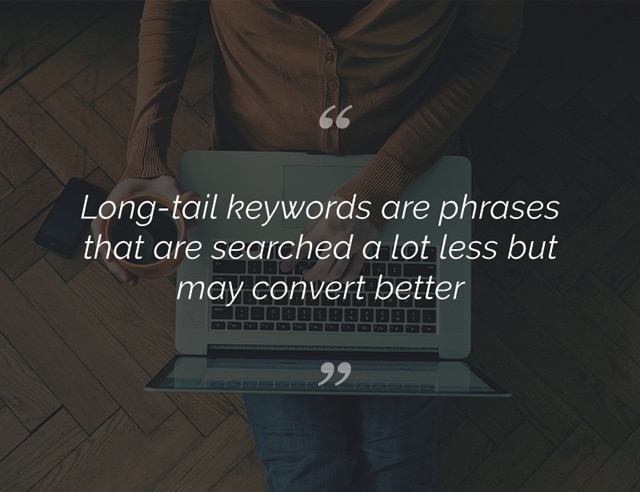50 Shades of SEO: Keywords are Your Best Friend 50 Shades of SEO – Part 3
May 12th, 2017
50 Shades of SEO – Part 3
Keywords are Your Best Friend
By Eugen Feygin
*This article was originally published in 2015. It has been so helpful for Zenfolio users that we have republished it!
SEO may not be the sexiest topic, but it’s crucial for a photographer today to know all about it. Why? Having SEO implemented will drive more traffic to your site so you can gain more clients and sell more. In the third installment of our SEO series, we talk about keywords and how to implement them on your website.
How do I select and use keywords?
Keywords are select words or phrases that people type into search engines when they want to achieve a certain result. Keep in mind that there are thousands of new phrases being typed into searches that no one can plan for, but if you are strategic you can make sure you have your bases covered on every front.
How do I know what keywords my customers are using?
Since Google is one of the largest search engines in North America, it has a lot of data that it is constantly collecting to better understand what people are searching. Google provides this data to its advertisers through Google AdWords. In Google AdWords there is a tool called the Keyword Planner that you can experiment with to understand what people search for. In addition to looking at the keywords you also need to consider the intent behind every keyword—for example, when someone is searching for event photography versus an event photographer. Both phrases get a lot of traffic, but the intent is different with each one. Should you target one or both?
The Strategy
Let’s say I would like to rank in first position when a person enters the phrase “Chicago wedding photographer.” Before I do my research in the keyword planner, I first need to assess my competitors and see what keywords/phrases they are using and how. You can simply look at their website titles as well as the text on the page. You can then use services such as SEO Moz to do a more in-depth search to see what phrases they tend to rank. An alternative solution is to hire an SEO expert, as they often have access to a lot more of these in-depth, fairly expensive tools and have a different understanding as to how to utilize them more effectively.
Once you have this information, go into the keyword planner and put in as many combinations as you can think of. You will then get a list of phrases and data that shows you how much traffic the phrases get per month, what the cost per click is, and some additional ideas for phrases you may have not even considered. Let’s say you currently rank number 21 for “Chicago wedding photographer” and you see that phrase is searched a lot and there is way too much competition for you to ever really get to the top—that’s when you need to revisit the strategy.
One idea is to go after customers in the social media arena, or you might discover that a lot of people search for a certain wedding venue in Chicago. In that case, you can create an amazing page on your site dedicated to that venue and weddings hosted that year. This tactic is basically going after long-tail keywords, which are phrases that are searched a lot less but might convert better. An interesting element to examine when you look at keywords is to consider how much people are paying for a certain keyword and ask yourself: why are they paying four to five times more for a certain phrase when it’s so long and has so little traffic? Maybe they discovered a trend and you just uncovered their secret!
How do I know what people are searching when they get to my site?
This used to be a fairly simply question to answer but unfortunately has become very difficult to determine. In the past you could log in to Google Analytics and the data was available, but Google has taken a large portion of that data away from us.
Google Webmaster Tools still tracks some of the keywords that result in traffic to your site. You can also go into Google Analytics and see what page a user lands on when they first interact with your site—and you can then assess the intent of their search.
Why did Google take away that information?
Manipulation is primarily the reason, I believe. When you can see that phrase X brought in so much traffic, you might only focus on that phrase and ignore the rest. Google doesn’t want you to just look at keywords and phrases but rather expand your content to focus on topics and ideas, as that is more natural.
Think about the last time you searched for something. Did you search “Chicago wedding photographer” or did you search “Chicago wedding photographers available in my area”? Which of the two is more natural for you? From a user perspective, Google would like for us to naturally interact with its search flagship instead of trying to figure out what phrases to search to get our intended result. Google even has Ok Google, a voice search option in its Chrome browser and Google mobile application. Because of this concept, it is trying to get online marketers to move away from keywords but not ignore them entirely. If you are targeting Chicago wedding photographer, you are still going to mention “Chicago,” “wedding” and “photographer” throughout your article, post or any of your content, and Google understands that. Its algorithm is learning intent slowly, and when the person who may not use the exact phrase “Chicago wedding photographer” it might rank higher than one that does because that first site is doing it naturally and the second one is trying to manipulate the outcome (of course, there are other metrics involved).
Recap
The goal is to provide as much variety as possible to cover your bases: yes, use the keyword(s) but also vary the phrases, talk about topics relating to the keyword, get links from other sites with similar ideas or topics that relate to the keyword and go from there. You need to make sure that there is enough variety so that you can infer what the page is about to help boost your rankings without being so direct. You could even join discussion threads across multiple wedding forums and jump in and assist with any questions and mention your site as a resource (do not use your targeted keyword to link back to your site!).
Next, be sure to read part four of this series, The Secrets of Social Media.
* * *
 Eugene Feygin is a Chicago-based SEO consultant with more than a decade of experience helping local photographers and small businesses around the country strategically utilize online marketing. He is also a fashion and corporate event photographer who produces high caliber work for event and production companies around the country. Check out his photography website as well as his SEO consulting website.
Eugene Feygin is a Chicago-based SEO consultant with more than a decade of experience helping local photographers and small businesses around the country strategically utilize online marketing. He is also a fashion and corporate event photographer who produces high caliber work for event and production companies around the country. Check out his photography website as well as his SEO consulting website.





